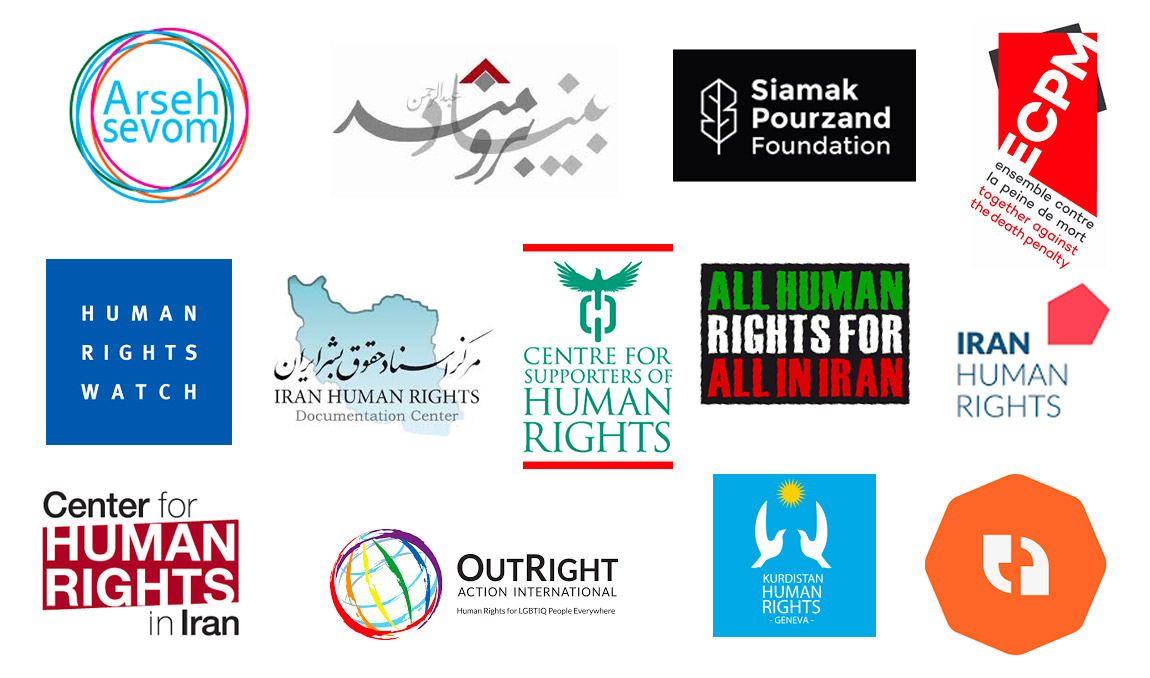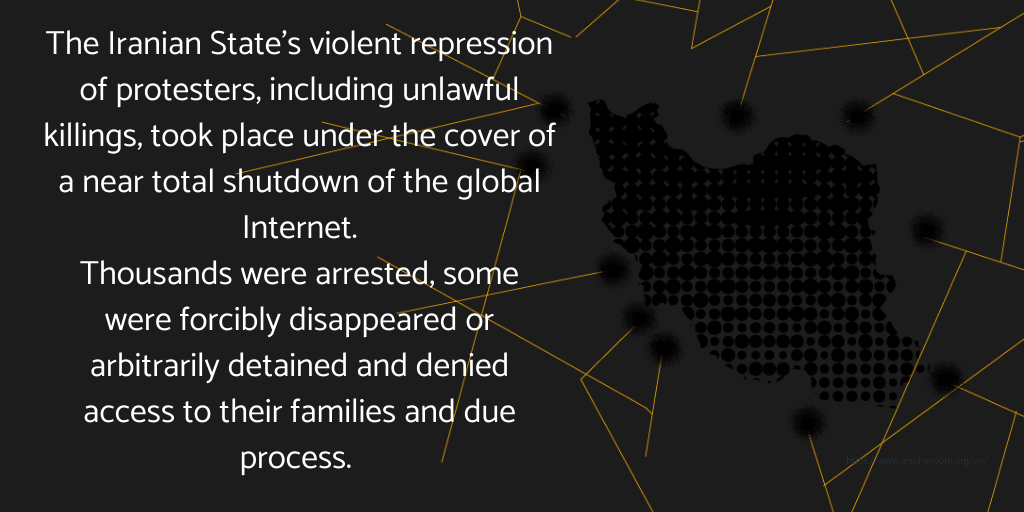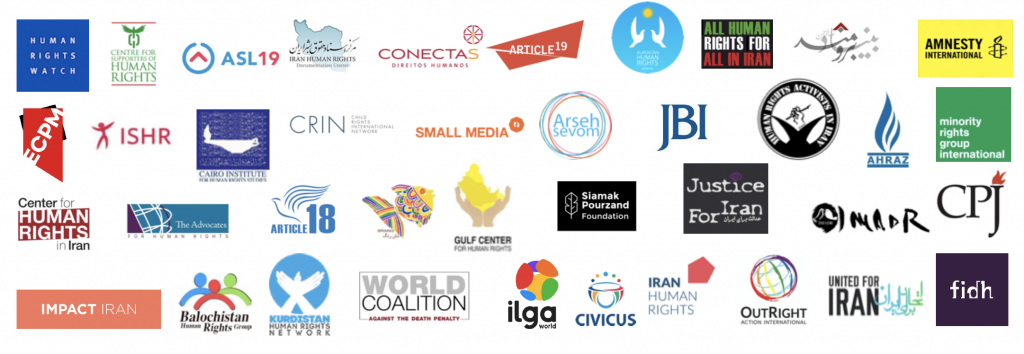
Joint Letter on the Arrests of Activists’ Relatives by the Iranian Government
October 4, 2019
24 Human Rights Groups Call for a UN Special Session to Address Repression in Iran
December 19, 2019
Monday, 9 December 2019
TO: All Permanent Missions to the United Nations in New York
Your Excellencies,
The undersigned national, regional and international civil society organizations urge your government to support resolution A/C.3/74/L.27, adopted by the General Assembly’s Third Committee on 14 November 2019, when it comes for adoption by its plenary later this month.
As the situation in Iran has been marked in recent weeks by another human rights crisis, in addition to supporting the resolution, we call on you to publicly condemn the grave human rights violations that continue to be perpetrated by the Iranian authorities and to help ensure those responsible are held to account.
The resolution calls on the Iranian authorities to release anyone detained for peacefully exercising their rights including people detained solely for taking part in peaceful protests.
Iranian security forces have continued to crack down on protests with complete impunity. Since 15 November 2019, they have used excessive and lethal force to crush protests that have taken place in more than 100 cities across Iran and to unlawfully kill unarmed protesters. The number of people believed to have been killed during the demonstrations has risen to at least 208, based on credible reports received by Amnesty International. The undersigned organizations believe the real death toll is likely to be significantly higher.
Horrific accounts from eyewitnesses and victims’ relatives, information gathered from human rights activists and journalists outside Iran and extensive verified video footage all provide clear evidence that the security forces have used firearms against unarmed protesters who posed no threat to life. This intentional lethal force and other unnecessary or excessive force used against unarmed protesters is an escalation of past abusive practices of Iran’s security forces, who have previously unlawfully killed and injured unarmed protesters with impunity.
At least 7,000 people have also been arrested, according to one parliamentarian. Those detained since the protests began include journalists and human rights defenders. The undersigned organizations are seriously concerned about the fate and whereabouts of the detainees, many of whom have been subjected to enforced disappearance or have otherwise been arbitrarily detained and denied access to their families and lawyers of their own choosing. Harrowing reports and verified video evidence show that some detainees have been subjected to torture and other ill-treatment in detention centres and prisons. Consistent with past patterns of abuse, the authorities have broadcast the “confessions” of several detainees likely obtained under duress or torture and other ill-treatment. In addition, the authorities have made statements smearing protesters as “villains” and “rioters,” calling for their execution.
Within 48 hours of the start of the protests, the authorities implemented a near total shutdown of global internet communications, cutting off nearly all means of online communications for people inside Iran. The National Information Network, which kept domestic platforms online throughout the shutdown, is known to be monitored by Iranian officials. The resulting information blackout was a deliberate attempt by the authorities to prevent people from sharing images and videos of the deadly force being used by security forces. Shutting down communications over the Internet is a systematic assault on the right to freedom of expression, which includes the right to seek, receive and impart information and ideas through any media. This has placed barriers to international monitors – including UN human rights experts – and their efforts to document the unfolding situation in the country.
Arbitrary restrictions on the rights to freedom of expression, association and peaceful assembly are highlighted in the draft resolution, alongside other long-standing patterns of human rights violations that Iranian authorities must address, including the arbitrary arrest and detention of journalists and human rights defenders including lawyers, women’s rights activists, labour rights activists, minority rights activists and environmental activists. Other human rights defenders who continue to be targeted include anti-death penalty campaigners and those seeking truth, justice and reparation for the mass extrajudicial executions and enforced disappearances of the 1980s. To this date, Iranian authorities have refused to provide an official number of those killed and arrested during the protests, while using the lack of official figures as grounds for dismissing reported death tolls and arrest numbers.
The UN Working Group on Arbitrary Detention has also noted in its recent decisions a pattern of targeting foreign nationals, dual nationals and Iranian nationals with permanent residence in other countries for prosecution and imprisonment.
The draft resolution also expresses serious concern about the Iranian authorities’ continuing use of the death penalty. Iranian law retains the death penalty for some drug trafficking offences. Iranian authorities continue to use the death penalty for some consensual same-sex sexual conduct and for vaguely worded offences such as “enmity against god” (moharebeh) and “spreading corruption on earth” (efsad-e fel arz). They also continue to use the death penalty against individuals who were under the age of 18 at the time of the crime, in flagrant violation of Iran’s obligations under the Convention on the Rights of the Child and the International Covenant on Civil and Political Rights as well as under customary international law, which requires urgent action by UN member states.
The Iranian authorities continue to deny individuals facing some charges, including those related to national security, access to independent lawyers of their own choosing at the investigation stage.
Torture and other ill-treatment, including through the denial of medical care in detention, remains widespread, is systematic in national security-related cases, and is perpetrated with impunity. In 2019 alone, torture may have caused or contributed to the death in custody of at least two people in detention.
The undersigned organisations are also deeply concerned about the widespread and systematic discrimination and violence based on gender, religion or belief, ethnicity, gender identity and sexual orientation that are enshrined in Iranian law, policies and state practices and that seriously impede civil, political, economic, social and cultural rights, as documented in the reports of the Special Rapporteur on the situation of human rights in Iran and of the UN Secretary General presented to the UN General Assembly.
Women face entrenched discrimination, enshrined in law, including in relation to divorce, inheritance and employment. Gender-based violence against women and girls, including domestic violence and early and forced marriage, has not been criminalised. The authorities have intensified their crackdown against women’s rights defenders who have campaigned against discriminatory compulsory veiling laws and have sentenced some to prison and flogging.
Ethnic minorities, including Ahwazi Arabs, Azerbaijani Turks, Baluchis, Kurds and Turkmen, continue to face entrenched discrimination.
Freedom of religion or belief is systematically violated in law and practice and religious minorities including Baha’is, Christian converts, Gonabadi Dervishes, Jews, Yaresan (Ahl-e Haq), and Sunni Muslims face systematic discrimination.
Despite the repeated calls not only from our organisations, but also from UN treaty bodies, Special Procedures, the UN Secretary General as well as many states in the framework of the Universal Periodic Review, the Iranian authorities have failed to take concrete steps to address these human rights concerns.
Draft resolution A/C.3/74/L.27 provides an opportunity for the General Assembly to raise serious concern and publicly condemn the grave human rights situation in the country. The resolution calls on Iran ‘to launch a comprehensive accountability process in response to all cases of human rights violations, including allegations of excessive use of force against peaceful protesters’ and offers key recommendations for long-overdue human rights reforms, in line with the many recommendations made by UN human rights bodies.
By supporting this resolution, the UN General Assembly will send a strong message to the Iranian authorities that, in this time of crisis more than ever, the fulfilment by Iran of its human rights obligations remains a priority for the international community, and that genuine and tangible improvements to the situation are expected.
Abdorrahman Boroumand Center for Human Rights in Iran
All Human Rights for All in Iran
Amnesty International
Arseh Sevom
Article18
ARTICLE 19
ASL19
Association for the Human Rights of the Azerbaijani people in Iran (AHRAZ)
Balochistan Human Rights Group
Cairo Institute for Human Rights Studies
Center for Human Rights in Iran
Centre for Supporters of Human Rights
Child Rights International Network (CRIN)
CIVICUS
Committee to Protect Journalists
Conectas Direitos Humanos
Gulf Centre for Human Rights
Human Rights Activists in Iran (HRAI)
Human Rights Watch
Impact Iran
International Federation for Human Rights (FIDH)
International Lesbian, Gay, Bisexual, Trans and Intersex Association (ILGA)
International Movement Against All Forms of Discrimination and Racism (IMADR)
Iran Human Rights
Iran Human Rights Documentation Center
International Service for Human Rights
Justice for Iran
Kurdistan Human Rights -Geneva (KMMK-G)
Kurdistan Human Rights Network (KHRN)
OutRight Action International
The Jacob Blaustein Institute for the Advancement of Human Rights (JBI)
Together against the death penalty (ECPM)
Minority Rights Group International
Siamak Pourzand Foundation
Small Media
The Advocates for Human Rights
United for Iran
World Coalition Against the Death Penalty
6Rang (Iranian Lesbian and Transgender Network)





